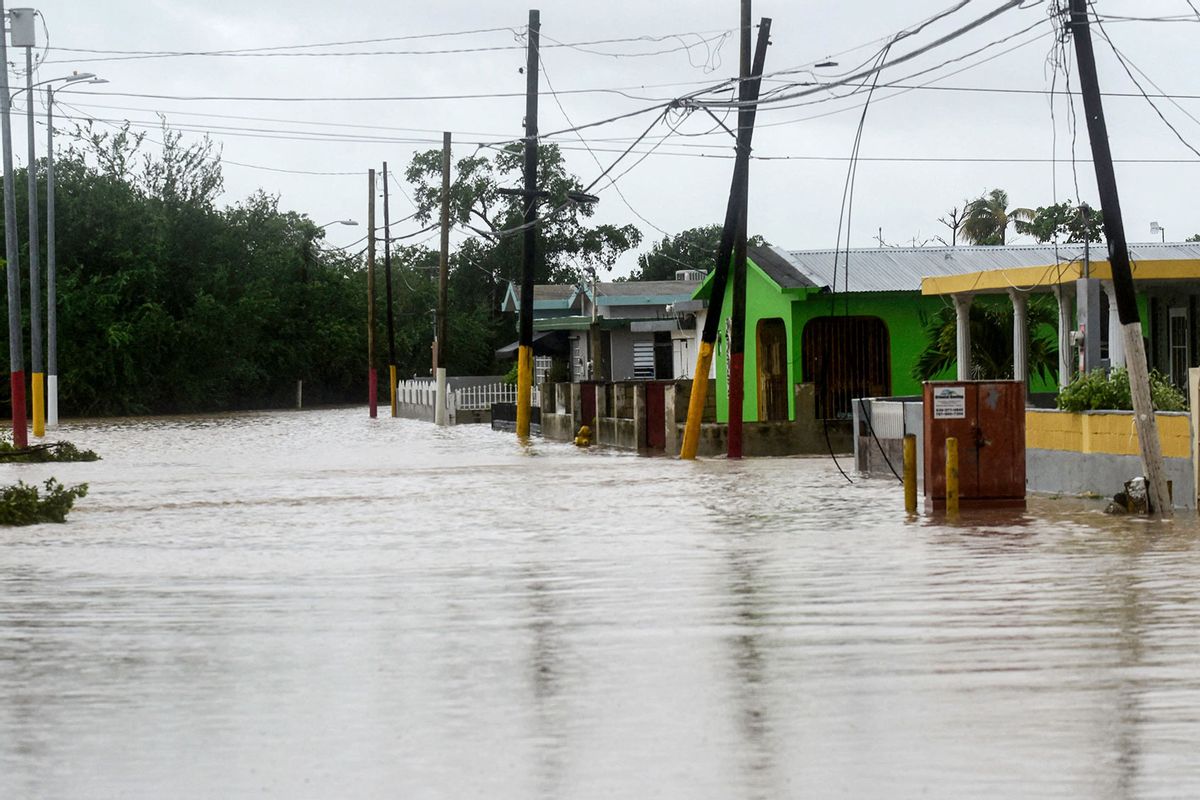One day before President Donald Trump took office in 2017, the Environmental Protection Agency (EPA) issued a public warning that climate change had caused Puerto Rico's climate to warm by more than one degree Fahrenheit since the mid-20th century. The surrounding ocean waters had warmed by almost two degrees since 1901. As a result of these trends the EPA warned that "rising temperatures are likely to increase storm damages, significantly harm coral reefs, and increase the frequency of unpleasantly hot days."
"Climate change is super-charging these storms, making them stronger, and packing greater flooding potential."
By the time Summer 2017 had come and gone, Hurricane Maria had caused roughly 3,000 fatalities in the American commonwealth as well as an estimated $90 billion in damages. Then-President Trump aroused controversy for neglecting Puerto Rico and focusing more on victims in conservative states like Texas.
Five years later, history appears to be repeating itself as the tiny Caribbean island — which has yet to recover from the battering and neglect it received in 2017 — is being pummeled by Hurricane Fiona.
Experts who spoke to Salon are once again saying there is ample scientific evidence that the massive natural disaster caused by this hurricane is exacerbated by the effects of man-made climate change.
"Although climate change cannot be directly linked to increased hurricane intensity (yet), there are definitely more and more hurricanes, typhoons or cyclones storms in many parts of the world," Dr. Ali S. Akanda, an associate professor and graduate director of civil and environmental engineering at the University of Rhode Island, told Salon by email. "It is understood that the warming of the oceans and the atmosphere are probably contributing to these occurrences." In the case of Puerto Rico, this reality will make it increasingly difficult for the island's beleaguered inhabitants to pick up the pieces of their lives when natural disasters hit.
"The island hasn't fully gotten back on its feet since Hurricane Maria came ashore roughly the same time in 2017," Akanda noted. "The intense rainfall and following floods will damage bridges, roadways, houses, utilities, and essential infrastructure. In addition, the longer-term economic impacts will close many businesses and make many people move out of San Juan and even from Puerto Rico itself."
Want more health and science stories in your inbox? Subscribe to Salon's weekly newsletter The Vulgar Scientist.
Dr. Michael E. Mann, an American climatologist and geophysicist and currently director of the Earth System Science Center at Pennsylvania State University, broke down the dynamics of exactly how climate change is worsening the hurricanes striking Puerto Rico.
"Climate change is super-charging these storms, making them stronger, and packing greater flooding potential," Mann wrote to Salon. "The intensification of Fiona to a strong Category 4 storm is part of larger trend toward more intense hurricanes, and warmer oceans mean more moisture in these storms, and more flooding when they make landfall (like we saw with Fiona in Puerto Rico)."
Only 41 percent of Puerto Ricans currently have access to their water service, only 27 percent have access to their electricity service and only 71 percent have functional telecommunications antennas.
Since even the most proactive human technology will not be able to fully avert the short-term effects of climate change, those who live in vulnerable locations will continue to suffer disproportionately unless they find ways of preparing for the worst. Dr. William Sweet, a scientist at the National Oceanic and Atmospheric Administration (NOAA), wrote to Salon that "looking towards the future, coastal communities exposed to tropical cyclones will have to defend against both the rare event and the more chronic flooding brought on by rising seas."
Another NOAA official elaborated on how weather and sea level conditions are expected to worsen.
"In a general sense I would expect that for each 1 degree [Celsius] rise in tropical sea surface temperatures, we would see about a 7 percent increase in tropical cyclone rainfall rates," Tom Knutson, a physical scientist at NOAA's Geophysical Fluid Dynamics Lab in Princeton, NJ, told Salon by email. "This increase is higher in some simulations of hurricanes, but I'm just reporting an average value from various studies."
These calamities not only cause immediate devastation through the weather, but also more subtle and long-term public health problems. People will struggle to obtain clean water and provide for their sanitary needs, and diseases that flourish in fetid conditions will break out. At the time of this writing on Wednesday, only 41 percent of Puerto Ricans currently have access to their water service, only 27 percent have access to their electricity service and only 71 percent have functional telecommunications antennas.
"Authorities need to watch out for the deadly vector-borne disease Dengue in areas where flood water will stagnate, and waste and piled up damaged material will provide breeding ground for mosquitoes," Akanda warned. "Puerto Rico is a historically Dengue endemic region and has been severely affected by the disease in recent decades. Continuing water insecurity in hurricane damaged areas may force people to store household water in drums and open containers, which also contribute to growing mosquito populations."

Shares